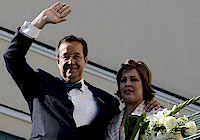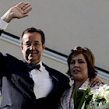
ILVES WINS ESTONIA’S PRESIDENCY
Publication: Eurasia Daily Monitor Volume: 3 Issue: 179
By:

Toomas Hendrik Ilves won Estonia’s presidency on September 23 by the narrowest possible margin, with 174 votes in his favor — just one vote more than the 173 necessary — in the 345-strong electoral college. The incumbent president, Arnold Ruutel, received 162 votes. Nine electoral college members declined to vote or spoiled their ballots at the instigation of pro-Ruutel party leaders.
Until the final vote count, it seemed likely that enough Ruutel supporters would decline to vote or spoil their ballots, so as to invalidate the voting process in the electoral college and return the process to the parliament. There, Ilves had earlier received 64 votes, four short of the two-thirds majority necessary for electing the president in the 101-strong legislature. Thirty-six deputies had declined to vote, pursuant to official instructions from pro-Ruutel party leaders who feared that some of these deputies would follow their conscience and vote for Ilves if they entered the voting booth.
Thus, Edgar Savisaar and Villu Reiljan, leaders respectively of the Center Party and People’s Union, derailed the presidential election in parliament and came very close to derailing it in the electoral college, sacrificing the integrity of Estonia’s constitutional processes in order to defeat Ilves through Ruutel or some last-minute “compromise candidate.”
Recent opinion surveys showed Ilves’ popularity rating at 65-70% and rising thanks to his campaign performance. The surveys showed Ilves outscoring Ruutel also in rural areas, which are traditional strongholds for both Ruutel and the People’s Union. This situation recalls Estonia’s first elections to the European Parliament in 2004, when Ilves’ personal popularity enabled his small Social-Democrat Party to gain a majority of Estonia’s seats in the Europarliament in Brussels.
Thus, notwithstanding the razor-thin outcome in the electoral college, Ilves has emerged as president of the nation as a whole, as well as the choice of almost two-thirds of parliamentary deputies from four parties. As president-elect, in line with the constitution he has relinquished his affiliation with the Social-Democrat Party and has already called for abandoning the notion of “pro-presidential party” from now on (the People’s Union filled that niche during Ruutel’s presidency).
Ilves’ election also invalidates the recent deal among Ruutel, the Center Party, and the People’s Union. Under that deal, a reelected Ruutel was to have reciprocated by nominating Savisaar as prime minister of a Center Party-People’s Union government in the spring of 2007, with Ruutel slated as guarantor of that agreement. Such a constellation could have brought non-transparent business interests associated with Savisaar as well as Russian interests close to the center of power in the country (see EDM, September 22). With parliamentary elections due in spring 2007, a center-right alliance of the Pro Patria Union, Res Publica, the Reform Party, and Social Democrats seems likely to form the government
Estonia’s presidency holds limited powers within a parliamentary republic. However, the presidential office gained high moral authority and intellectual luster during Lennart Meri’s presidency (1991-2001), when the head of state initiated discussions on issues of importance to society and was an active opinion leader. While Meri’s performance is remembered as that of a president larger than the office he held, Ilves’ qualifications and international authority are those of a president larger than the country he represents. As president-elect, he has announced his intentions to place Estonia “among the generators of ideas in Europe,” to speak up in EU debates on behalf of Estonia and the EU’s new member and aspirant countries, and to help increase the influence of the EU’s new member countries on the formation of common EU policies. An influential voice on these issues as Vice-Chairman of the European Parliament from 2004 to date, Ilves will be even better placed as head of state to influence international debates and decisions on these issues.
Ilves recommends that Estonia conduct its relations with Russia through the European Union and that it work with the European Commission to raise with Russia the issues of interest to Estonia. The Russian Duma’s international affairs committee chairman, Konstantin Kosachev, promptly criticized the president-elect for having “never acknowledged that Estonia had joined the Soviet Union de jure” (Interfax, September 23). Such remarks suggest that Moscow is interested in unsettled relations with the Baltic states even at the cost of singularizing Russia with that position.
Ilves is scheduled to take the presidential oath before the parliament on October 9 and will, in late November, host U.S. President George W. Bush in Estonia.
(BNS, Postimees, Aripaev, September 23-26; see EDM, September 22)




